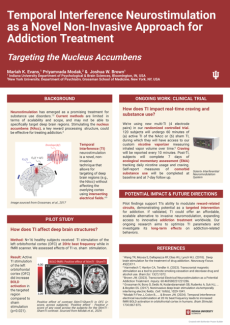Temporal Interference Neurostimulation as a Novel Non-Invasive Approach for Addiction Treatment: Targeting the Nucleus Accumbens

Background. Substance use disorders (SUDs) remain a major global health burden. Neurostimulation has emerged as a promising treatment by directly altering brain circuits implicated in addictive behaviors, but current methods are limited in terms of scalability or scope. Temporal Interference (TI) neurostimulation, a non-invasive technique that allows for targeted deep brain stimulation without affecting overlying cortical regions, could address this issue. TI may modulate addiction-related brain activity, particularly through stimulating the nucleus accumbens (NAcc), a key reward-processing structure. (2)
Pilot study. Our team’s pilot study (n=20) applied TI at 20 Hz beat frequency, assessing its effects on deep brain structures. Results demonstrated significant modulation of reward-related circuits, including increased BOLD activity in the orbitofrontal cortex (p=0.021), which is functionally connected to the NAcc. Participants reported good tolerability and acceptability. (3)
Clinical trial. We are initiating the first randomized controlled trial of its kind to assess TI’s real-time impacts on craving and substance use. Subjects will undergo 60 minutes of (a) active TI of the NAcc or (b) sham TI, during which they will have access to our custom nicotine vaporizer measuring inhaled vapor volume over time. Craving will be reported every 10 minutes. Post-TI, subjects will complete 7 days of ecological momentary assessment (EMA), tracking daily nicotine usage and craving. Self-report measures of substance use will be completed at baseline (e.g., BAM) and at 7-day follow-up. (4)
Conclusion. Pilot findings support TI’s potential as a targeted intervention for addiction. The success of the pilot study paves the way for our trial investigating TI’s effects on craving and nicotine use. If validated, TI could offer an affordable, scalable alternative to invasive neuromodulation, expanding access to innovative addiction treatment worldwide. Our ongoing research aims to optimize TI parameters and investigate its long-term effects on addiction-related behaviors.